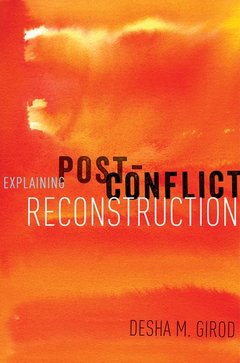Explaining Post-Conflict Reconstruction
Langue : Anglais
Auteur : Girod Desha

The international community has donated nearly one trillion dollars during the last four decades to reconstruct post-conflict countries and prevent the outbreak of more civil war. Yet reconstruction has eluded many of these countries, and 1.9 million people have been killed in reignited conflict. Where did the money go? This book documents how some leaders do bring about remarkable reconstruction of their countries using foreign aid, but many other post-conflict leaders fail to do so. Offering a global argument that is the first of its kind, Desha Girod explains that post-conflict leaders are more likely to invest aid in reconstruction when they are desperate for income and thus depend on aid that comes with reconstruction strings attached. Leaders are desperate for income when they lack access to rents from natural resources or to aid from donors with strategic interests in the country. Using data on civil wars that ended between 1970 and 2009 and evidence both from countries that succeeded and from countries that failed at post-conflict reconstruction, Girod carefully examines the argument from different perspectives and finds support for it. The findings are important for theory and policy because they explain why only some leaders have the political will to meet donor goals in the wake of civil war. The findings also shed light on state-building processes and on the political economy of post-conflict countries. Paradoxically, donors are most likely to achieve reconstruction goals in countries where they have the least at stake.
Desha Girod (Ph.D. Stanford University) specializes in international and comparative political economy of developing countries. She focuses on foreign aid and natural resources. Her research appears in The American Journal of Political Science, Comparative Political Studies, Conflict Management and Peace Science, The Journal of North African Studies, and The Quarterly Journal of Political Science. She is a member of the Executive Committee of Georgetown's Center for Latin American Studies and a faculty affiliate of Georgetown's African Studies Program. Professor Girod received her Ph.D. in Political Science from Stanford University in 2008. She also held a post-doctoral fellowship at Stanford's Center on Democracy, Development, and the Rule of Law.
Date de parution : 02-2015
Ouvrage de 224 p.
16.2x23.7 cm
Date de parution : 02-2015
Ouvrage de 224 p.
16.6x23.4 cm
Thèmes d’Explaining Post-Conflict Reconstruction :
© 2024 LAVOISIER S.A.S.



